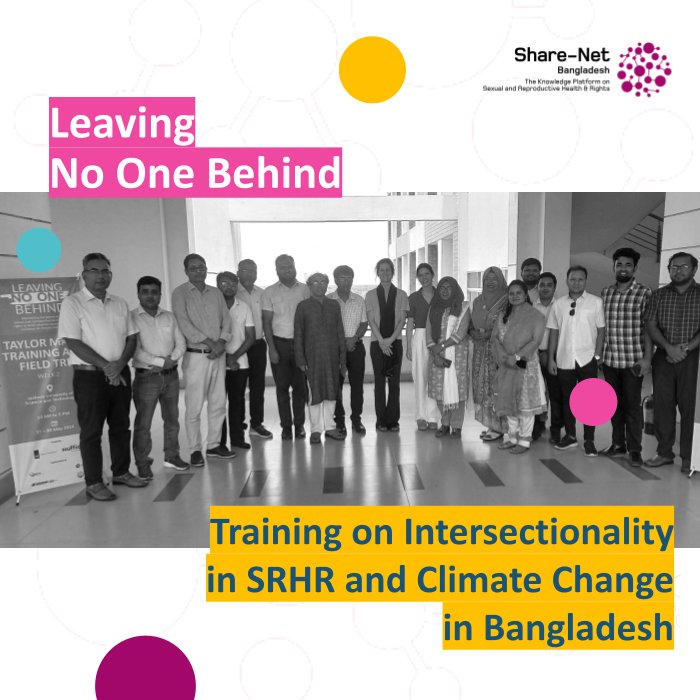Leaving No One Behind: Training on Intersectionality in SRHR and Climate Change in Bangladesh
“Leaving no one behind” is more than a slogan; it’s a vital objective that drives global sustainable development goals (SDGs). Addressing the intertwined issues of sexual and reproductive health and rights (SRHR) and climate change resilience is essential for building a sustainable future. From May 28 to 30, 2024, an impactful training program took place at the Department of Climate and Disaster Management, Jashore University of Science and Technology (JUST), focusing on how these critical issues intersect.
Funded by the Dutch Ministry of Foreign Affairs and managed by Nuffic, the Tailor-Made Training (TMT) program titled “Leaving No One Behind: Maximising the Power of SRHR to Build Adaptive Capacity and Resilience to Climate Change” is a collaborative effort. The Department of Climate and Disaster Management at JUST and the Department of Gender and Development Studies at Begum Rokeya University, Rangpur (BRUR) requested this training. The implementation was carried out by Q-Point Netherlands, Gender2Connect, and RedOrange Communications.
The training explored the connections between gender, SRHR, and climate change resilience through an intersectional perspective. This approach is crucial in understanding how various societal power imbalances impact people’s access to sexual and reproductive health services and their vulnerability to climate change.
Exploring Intersectionality in SRHR and Climate Change
The concept of intersectionality highlights how overlapping identities and social factors—such as gender, race, and economic status—affect individuals’ experiences and opportunities. In the context of SRHR and climate change, this means recognising that marginalised groups often face compounded challenges.
For instance, women in rural areas may have limited access to reproductive health services due to both gender-based discrimination and the impacts of climate change on healthcare infrastructure. By examining these interconnected challenges, policies can be better tailored to address the unique needs of these vulnerable populations.
Embracing Intersectionality in Policy and Practice
The training encouraged participants to embrace intersectionality in their work. Teachers, researchers, and practitioners in Bangladesh learned to integrate this perspective into their efforts to promote safe motherhood, SRHR, and climate change resilience.
One key takeaway was the importance of integrating intersectionality into policy, research, education, and practice. By doing so, it’s possible to make systems more responsive to the needs of those facing multiple marginalisation factors. This involves not only recognising the diverse experiences of different groups but also actively working to dismantle the societal power imbalances that create these disparities.
Discovering Solutions for Inclusive Development
The training emphasised a human rights-based approach to SRHR. This means recognising how societal power imbalances affect people’s health needs and finding solutions to these challenges. Addressing these issues is crucial for ensuring that everyone has access to good sexual and reproductive health.
Participants were encouraged to discover how to make provisions more responsive to SRHR for those facing multiple marginalisation factors and climate change vulnerabilities. This involves creating environments that promote well-being, social inclusion, and equality.
Interlinkages with Sustainable Development Goals
The training directly supports several SDGs, particularly those related to health (SDG 3), gender equality (SDG 5), and climate action (SDG 13). By addressing the intersection of SRHR and climate change, the program contributes to broader goals of poverty reduction (SDG 1) and reduced inequalities (SDG 10).
The “Leaving No One Behind” program is a critical step towards ensuring that development efforts in Bangladesh are inclusive and equitable. By focusing on the intersection of SRHR and climate change resilience, it paves the way for a future where no one is left behind, and everyone has the opportunity to thrive.

